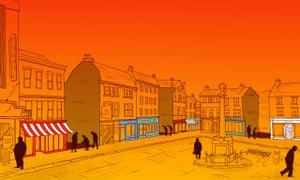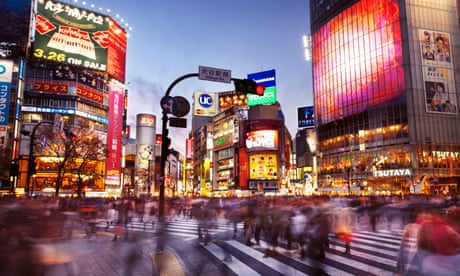
New research shows a hollowing-out of communities. Our wellbeing depends on restoring the pride of places

For the past nine years or so, I have been observing a regular journalistic ritual. In pursuit of enlightenment over where the country may be going, how people are going to vote, and their opinions about such massive issues as Brexit and Scottish independence, I have pitched up in scores of places and begun my inquiries with some version of a simple question: how is this place doing?
In most cases, I can still depend on the same answer quickly cropping up in at least 50% of conversations: a loud complaint about the number of closed-down shops and the dire state of the town centre. To some extent, such stories have now hardened into a grim cliche, summed up by those shots of boarded-up premises that are a staple of the TV news, and weekly reports about the fate of our high streets. But that does not make what people say any less true, or detract from how passionately they feel about something that has now been happening for over a decade.
The first big blow was the crash of 2007-08. At the same time, the rise of internet retailing began to radically change people’s shopping habits. Meanwhile, stagnating wages and stubborn business rate regimes combined to make everything immeasurably worse. Last week, the Guardian published new research covering 88 towns and cities, based on Ordnance Survey data, that highlighted how extreme all this now is. In England and Wales, the average town centre has lost 40 shops since 2013. Across the six towns that make up the city of Stoke-on-Trent, 23% of shops have closed in only five years; in Eastbourne, Blackpool, Sheffield and Rotherham, the numbers are not far behind. Clothes outlets have been hit hardest, but even the number of charity shops has fallen. In 2017 alone, nearly 6,000 shops closed in the UK; late last year, the accountancy firm PwC put the national rate of closure at 14 shops a day.
A lot of people I meet see the decline of previously bustling places as something beyond economics and more like a moral affront, routinely describing it as “disgraceful”, “awful” and that great British commonplace “disgusting”. How they feel feeds into a widespread sense of being neglected by powerful forces that lie beyond anyone’s reach and almost beyond rational explanation. But one thing is absolutely clear: the huge economic changes the media often summarise with the term “disruption” are now a matter of daily experience, feeding into the profound anxiety about the future that defines the national mood.
What perhaps gets lost in the coverage of shop closures is the deep symbolism of these losses, and how they affect a community’s basic self-esteem. It should be no great revelation that streets full of boarded-up shops eat away at a place’s sense of its own worth, and give a hollow ring to notions of “aspiration”. Marks & Spencer, for example, is in the midst of shutting more than 100 stores between now and 2022. The latest round of planned closures includes shops in such places as Boston, Cwmbran, Weston-super-Mare and Hull.
Having watched it happen elsewhere, I know this particular story well enough to understand what it means, quite apart from the job losses involved. In many places M&S either is, or was, the last town-centre store to offer things – from clothes to food – with some semblance of quality and even luxury. When its outlets close, you either get an empty space or one that is sooner or later filled by a discount chain. Human traffic suddenly drops. The old allure of a Saturday trip to town is snuffed out. Local people get a feeling of being irredeemably downgraded.
When certain stores close, two other things are suddenly lost: a symbol of shared experience, and collective connection to the past. Towards the end of last year, in the wake of House of Fraser being acquired by Mike Ashley’s Sports Direct group, it was announced that the chain’s Manchester department store – long known to local people as Kendals, the name it had until 2005 – was to close. After an intervention by the city council, it was eventually granted a reprieve. But in between, I experienced a very telling mixture of sadness and bafflement, and a keen sense of how important mere “retail” can be in our idea of who we are and where we live.
The store’s history goes back to the 1830s. I can remember my mum and dad going on shopping outings there. When I independently bought my first bit of clothing from the menswear department, it felt like a modest rite of passage. How, I now wondered, could Manchester exist without it – that huge, jaw-dropping art deco building, the wafts of perfume that floated out of the ground floor, the cafe and restaurant on the fourth floor that suburbanites such as me once thought of as the acme of sophistication?
Whatever happens to that store, central Manchester does not look likely to join the list of places where the number of vacant premises is turning critical. But elsewhere the future may look forlorn. Shops, moreover, are only one facet of a general hollowing-out. As banks close their branches, places lose not just symbols of local commerce but a vital service for businesspeople. (Where else do they get their change?) When a pub closes down, bang goes a precious shared space. The effects of austerity on libraries, museums, day centres and more is self-evident. And the terror of the current moment is that even the places that once claimed to have superseded traditional retail and commerce are now threatened by the new world of online everything: what, you can only wonder, are we going to do with vacant malls and shopping centres?
To even begin to answer these challenges, a place needs a mixture of things too often in short supply. One is high-quality local politicians motivated by civic pride, and with an ability to use their imaginations. In some places you see flashes of what this might mean. In Doncaster the council has plans for a radical reinvention of the town centre: rejuvenated markets; streets to be filled with restaurants, bars and cafes; buildings converted into living spaces – a mushrooming of the kind of creativity that has turned a former branch of British Home Stores into a huge trampolining centre. Even if there are huge obstacles, this is impressive and exciting. But in smaller places, it is still hard to shake off a sense that the 21st century is going to be defined by a kind of capitalism that will offer much more destruction than creation.
Clearly, we are not going pull ourselves away from Amazon and suddenly return to a halcyon era of sweets sold by the quarter and “Can I help you?”. But this country is in a weird, tortured state, and the condition of so many of its towns and cities is at the heart of its angst. When the Brexit mess starts to recede, and we finally get to talk about how on earth we are going to handle the future, this is where everything needs to start: in the places we still honour with such words as “centre” and “heart” – where fatalism and despondency need to be turned round, before it is too late.
The Guardian













Leave a comment